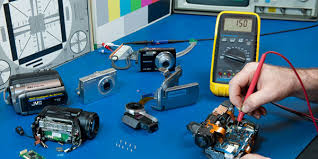
ITI IN ELECTRIC & ELECTRONIC
✅ ITI Electrician & Electronic Mechanic
(Year 1)
1. Basic Electrical Engineering
- Introduction to Electricity, Current, Voltage, Resistance
- Ohm’s Law, Series & Parallel Circuits
- Electrical Power, Energy & Efficiency
- Conductors, Insulators & Semiconductors
- Cells and Batteries – primary & secondary types
2. Magnetism & Electromagnetism
- Magnetic field, flux, MMF, reluctance
- Magnetic materials and hysteresis
- Electromagnetic induction, Lenz’s & Faraday’s laws
- Application in relays, contactors, solenoids
3. Basic Wiring & Domestic Installation
- Tools used in wiring and installations
- Types of wiring systems – Cleat, Batten, Conduit
- Wiring accessories – Switches, Sockets, Holders
- Wiring diagrams and symbols
- Simple circuit installation & testing
4. Measuring Instruments
- Types of measuring instruments
- Use of multimeter, ammeter, voltmeter
- Megger (insulation tester), Earth tester
- Energy meter – reading and usage
5. Electrical Safety & First Aid
- Electrical hazards – Shock, Fire, Short-circuit
- Earthing – pipe, plate, rod methods
- Fuses, MCB, ELCB, RCCB
- First aid for electric shock
- Safety signs and PPE (Personal Protective Equipment)
6. Introduction to Electronics
- Basics of electronics and semiconductor theory
- Diodes – types, characteristics, uses
- Rectifiers – half-wave, full-wave
- Soldering tools and techniques
- Identification of electronic components
7. Employability Skills – Year 1
- Communication skills – oral & written
- Reading comprehension and workplace behavior
- Basics of computer – MS Word, Excel, Email
- Time management & discipline
(Year 2)
1. Electrical Machines
- DC Motors and Generators – types and operation
- AC Motors – Single & Three-phase, Induction and Synchronous
- Alternators – construction and working
- Starters – DOL, Star-Delta, Auto-transformer
- Maintenance and testing of machines
2. Power Transmission & Distribution
- Basics of power generation – thermal, hydro, solar
- Transmission systems – overhead and underground
- Substations – components and layout
- Distribution board wiring, load balancing
- Power factor, load calculation, tariff
3. Advanced Wiring & Industrial Installation
- Wiring in workshops, factories, and offices
- Motor control circuits – DOL, Star-Delta
- Contactor and relay-based control circuits
- Panel wiring and cable termination
- Fault finding and preventive maintenance
4. Advanced Electronics
- Transistors – types, operation, and biasing
- Amplifiers – common emitter, common base
- Logic gates – AND, OR, NOT, NAND, NOR, XOR
- Timers (555), counters, and basic digital circuits
- Introduction to sensors and microcontrollers
5. Instrumentation & Control
- CRO (Cathode Ray Oscilloscope) – operation and use
- Clamp meter – current measurement
- Calibration of instruments
- Use of relay logic for automation
- Basics of PLC (optional/introductory)
6. Electrical Drawing & Estimation
- Reading and interpreting wiring diagrams
- Preparing load schedules and wiring plans
- Estimation of materials and costing
- Use of CAD software (optional in some institutes)
7. Employability & Entrepreneurship – Year 2
- Interview skills and resume writing
- Basics of entrepreneurship and startup ideas
- Financial literacy – savings, credit, insurance
- Government schemes for self-employment
- Teamwork, leadership, and customer service

